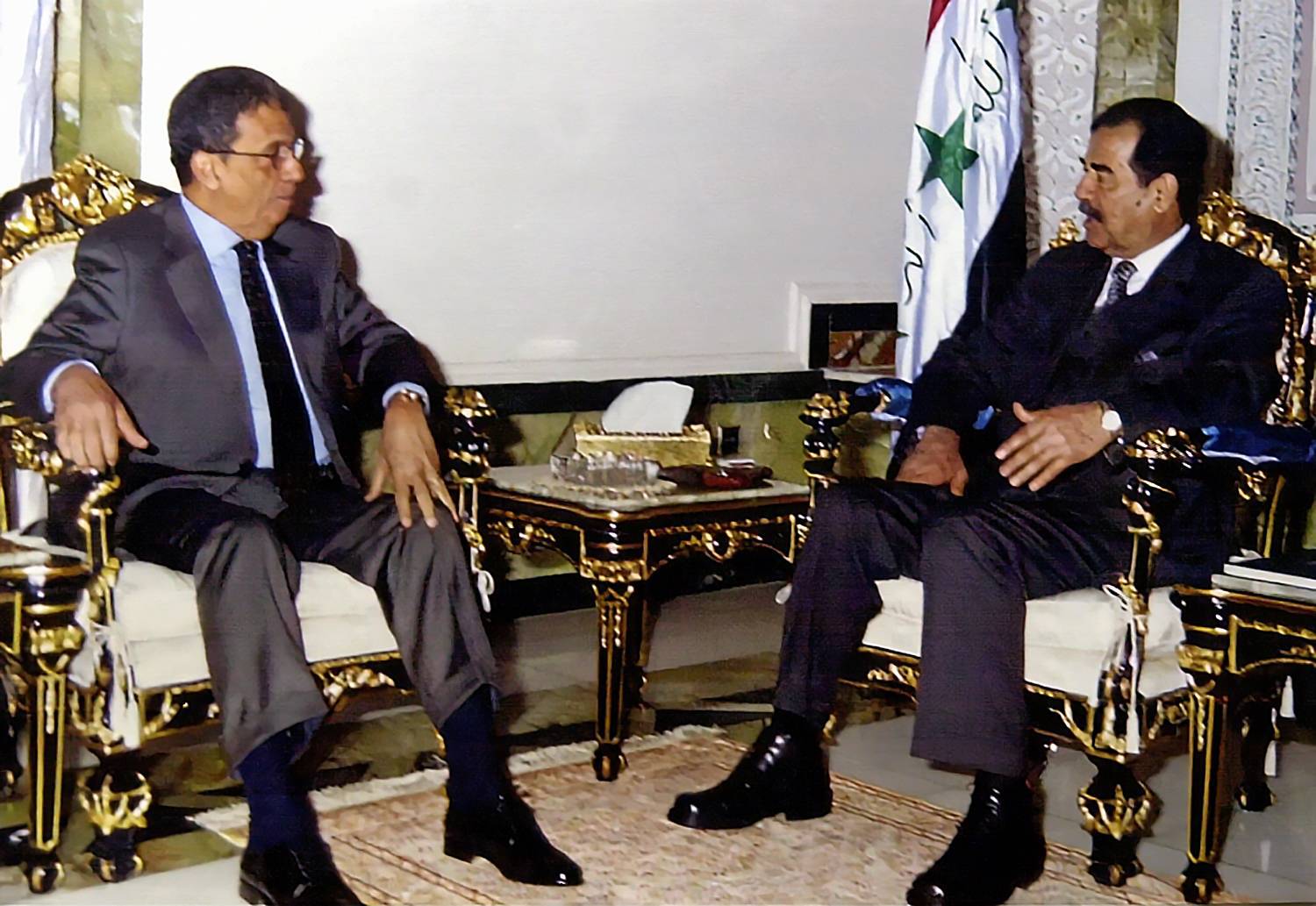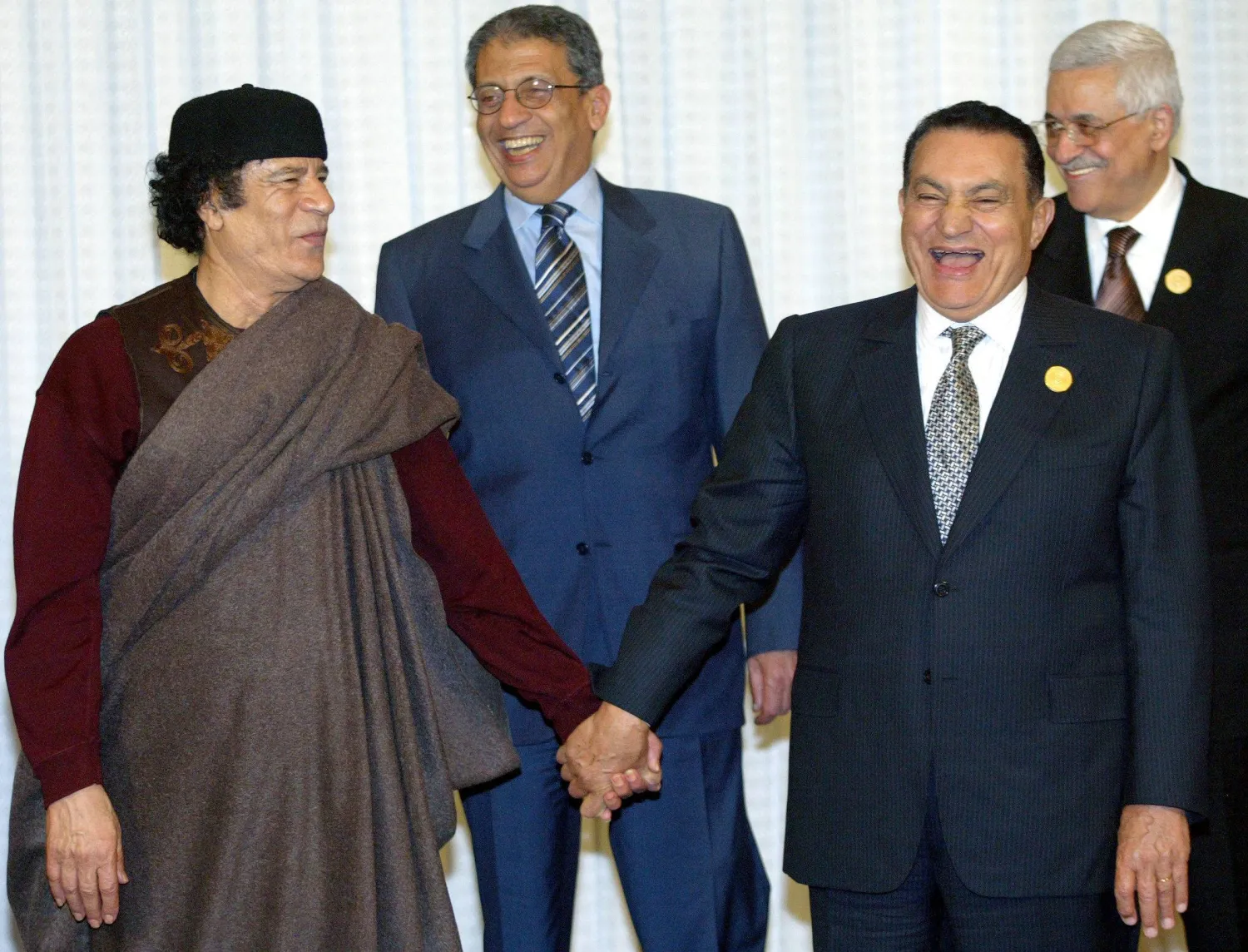In the third installment of his interview with Asharq Al-Awsat, former Egyptian Foreign Minister and ex-Secretary-General of the Arab League Amr Moussa discusses various experiences with Arab leaders, emphasizing the nuances of diplomacy in a turbulent region.
Moussa recalled that former Egyptian President Hosni Mubarak “was neither bloodthirsty nor a pharaoh, nor did he try to be one.” He points to a famous remark by President Anwar Sadat, who once said: “Gamal (Abdel Nasser) and I are the last of the pharaohs.”
The Gaddafi encounter
Reflecting on his complex interactions with Libyan leader Moammar al-Gaddafi, Moussa admitted that the beginning was anything but smooth. “When I first met Gaddafi, he treated me as if I were an American spy. He wouldn’t look at me directly, only speaking while facing another direction. It was very theatrical,” Moussa said. He recalled this behavior with a certain amusement, treating it almost like a game: “I would wager with myself before our meetings—will he speak to me directly this time, or not?”
Initially, rumors had reached Gaddafi that Moussa had been sent with a US agenda, though he had actually been Egypt’s ambassador to the UN in New York, not Washington. “But once he observed how I performed in my role, he began to change his mind. Eventually, he would ask President Mubarak if I could join their private discussions.”
Moussa recalled a specific instance in Tobruk, where he was invited by Gaddafi to sit at a table with him and Mubarak to discuss a matter of importance. He knew this would stir unease among others present, but the conversation went ahead regardless. This type of scene, he noted, happened several times.

Diplomatic drama in a tent
When Gaddafi visited Cairo during Moussa’s tenure as foreign minister, the Libyan leader insisted on setting up his trademark tent in the gardens of the Qubba Palace. Though the palace was fully equipped, Gaddafi would receive guests only in the tent. “At that time, he still saw me as a US spy,” Moussa said, “so he avoided looking at me during our meeting. He inspected every corner of the tent—except the one where I was sitting.”
Despite Gaddafi’s sometimes abrasive behavior, Moussa conceded that the Libyan leader was intelligent and unique. “He was eccentric, yes, but he had a cleverness about him. His actions often carried a deeper rationale, even if misguided.”
Gaddafi’s erratic rule extended to his own ministers. Moussa noted how even highly regarded officials like Abdul Rahman Shalgham and Ali Treki were subject to his whims. “If Gaddafi was displeased with something, he might simply tell you to stay home—and that could mean house arrest for years. Yet, your salary would still arrive at your door.”
A moment of humor
One incident stood out. Libya was scheduled to host the Arab summit and had failed to pay its dues to the Arab League, and as Secretary-General, Moussa received an envoy from Gaddafi carrying a list of demands. Moussa didn’t even read the letter; he simply locked it in a drawer. “When the envoy asked what to report back, I told him exactly that,” Moussa laughed.
Soon after, Gaddafi summoned him to Sirte. As Moussa waited in the tent, Gaddafi’s secretary, Bashir Saleh, walked by singing an old Arabic poem: “You seem tearless, and patience is your nature.” Moussa quipped: “Tell the leader he’s not tearless—he’s payment-less!” Saleh shared the joke with Gaddafi, who burst into laughter and finally paid Libya’s dues.
Later, during an Arab summit in Libya, Gaddafi displayed a surprising sense of responsibility. Moussa recalled a heated moment when Yemeni President Ali Abdullah Saleh demanded immediate action on forming a pan-Arab army. Gaddafi gently interrupted: “Take it easy, Ali.” That phrase—“Take it easy, Ali”—spoke volumes, according to Moussa. “It revealed Gaddafi’s desire to manage tension even among volatile leaders.”
On Hosni Mubarak and the ‘pharaoh’ myth
Asked if Mubarak ever resembled the authoritarian archetype of a “pharaoh” as Russians view their “czars,” Moussa was firm: “No, not Mubarak. Maybe Sadat had some traits—he liked symbolism. But Mubarak? He wasn’t violent, nor bloodthirsty. Yes, he could be firm, but he didn’t revel in bloodshed.”
Moussa clarified that while Mubarak might have approved harsh punishments as president, it never escalated to a murderous level. “Perhaps there were isolated incidents, especially within the prison system, but it wasn’t part of Mubarak’s character to govern through violence. He wasn’t built that way.”

The song that stirred controversy
When the Egyptian folk singer Shaaban Abdel Rahim sang “I hate Israel, and I love Amr Moussa,” it caused a stir. Moussa downplayed the drama. “I don’t think Mubarak himself was offended. He was the president; no foreign minister would rival him in popularity. But some people in the surrounding circles—not necessarily his inner circle—were irked.”
Eventually, another version of the song emerged, replacing Moussa’s name with Mubarak’s. “But it was the original that made waves. Even a diplomat from Latin America once told me, ‘We’re dancing to this song here!’”
A difficult meeting with Saddam Hussein
One of the most tense encounters Moussa ever had was with Iraqi President Saddam Hussein. After being elected Secretary-General of the Arab League in 2001, Moussa set out to visit all Arab leaders. He deliberately left Saddam until the end, knowing the sensitivities involved.
In January 2002, Moussa visited Saddam at a small palace. He carried a message from UN Secretary-General Kofi Annan regarding weapons inspections. “I told Saddam that Annan was open to negotiations, and that continued confrontation with the US would lead nowhere. At some point, no one would stand by him.”
Moussa asked Saddam directly: “Do you possess nuclear weapons?” Saddam answered, “No.” Moussa pressed him again: “Are you absolutely sure?” Saddam repeated, “No.” This made Moussa’s deputy, Ahmed Ben Helli, visibly nervous. “He probably thought we weren’t going to walk out of there.”
Moussa then asked why Iraq objected to the UN inspectors. Saddam responded: “These people don’t just inspect nuclear sites. They ask civilians about food supplies, their opinions on the government. What business is that of theirs?”
Moussa promised to report this to Annan, which he did. Negotiations resumed between Iraq and the UN, but history took its course and the US-led invasion followed.
Asked if he felt fortunate never to have served directly under a figure like Gaddafi, Moussa answered without hesitation: “Absolutely. I saw how respected men like Shalgham and Treki were sidelined. You could be a top official one day and under house arrest the next.”
















